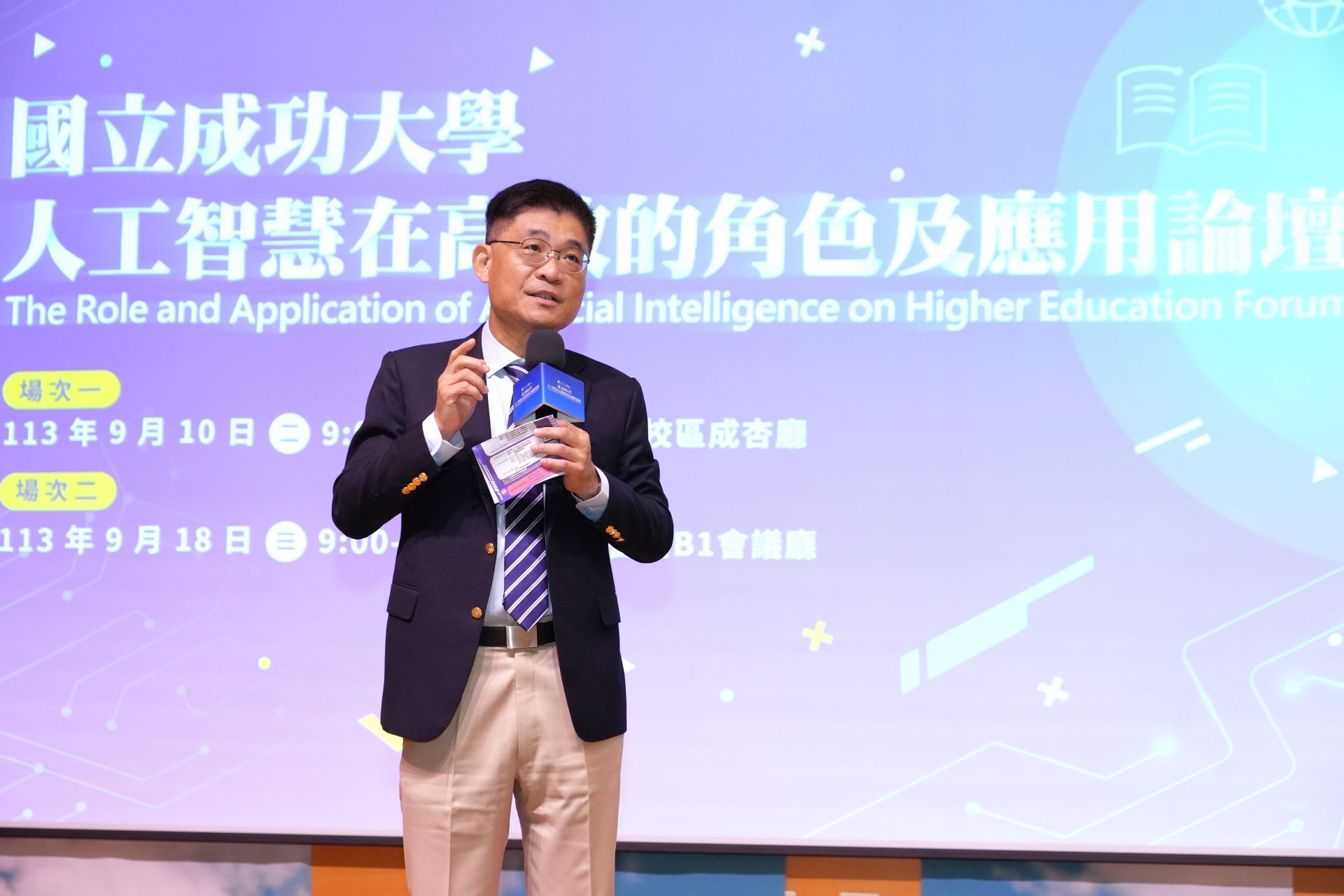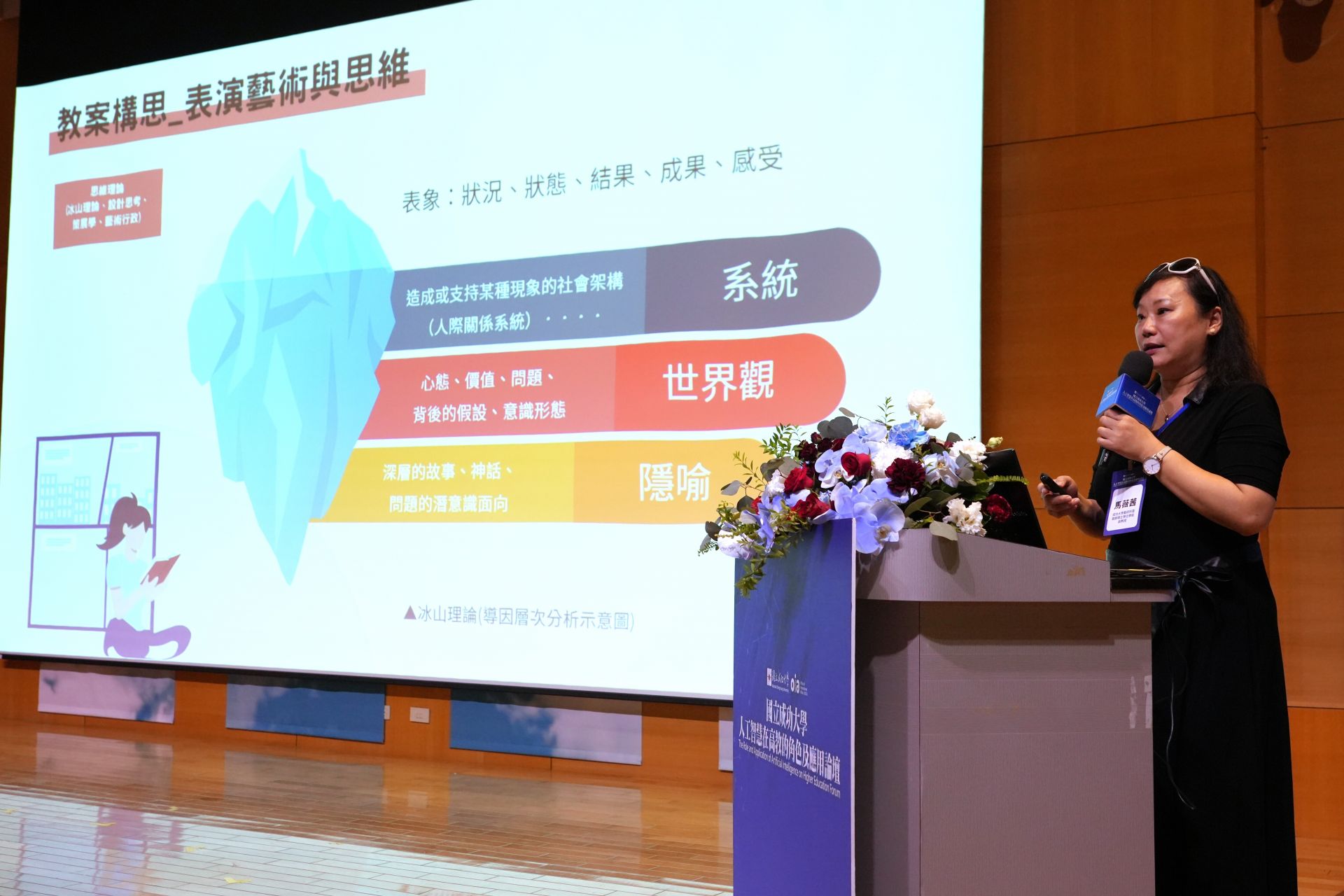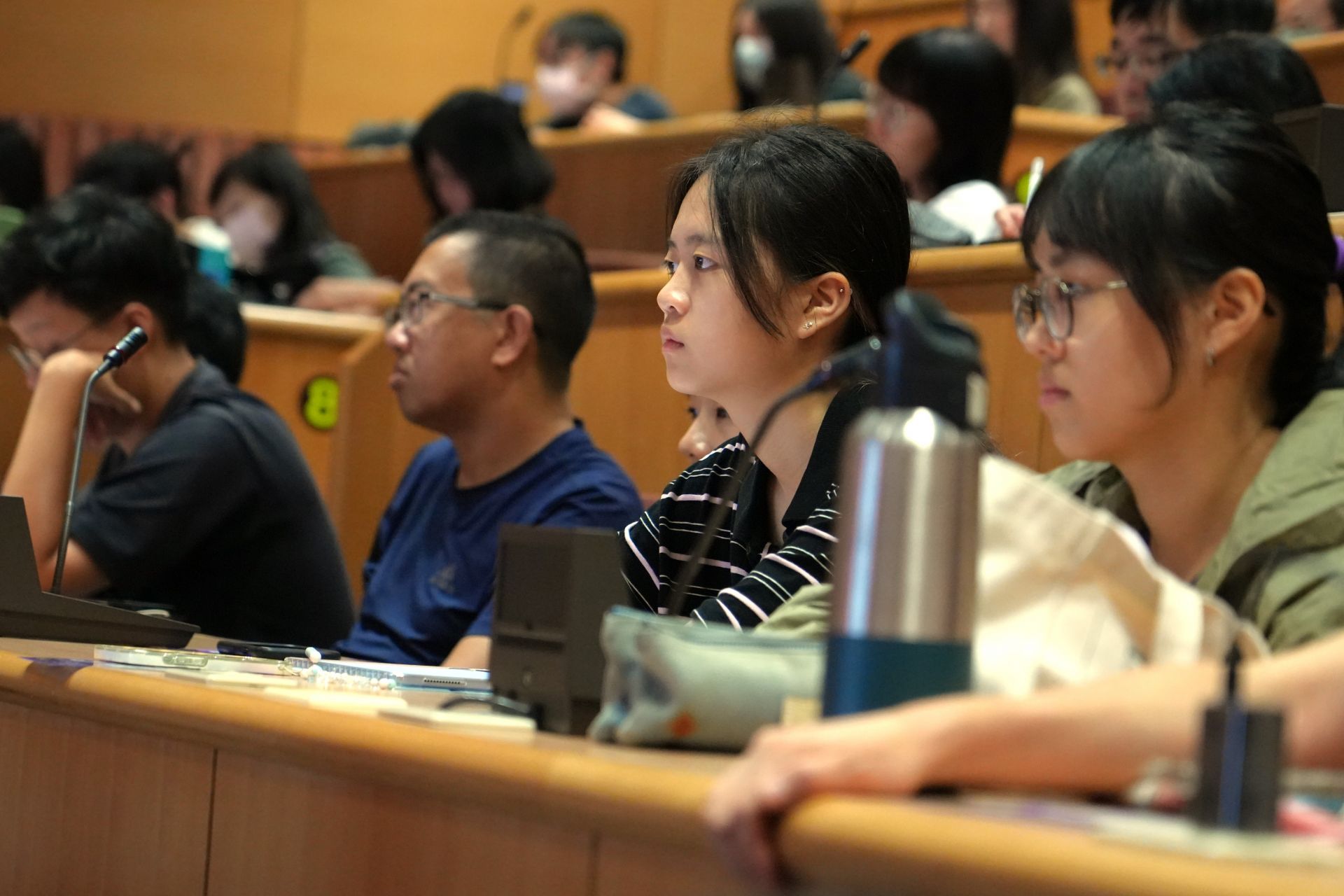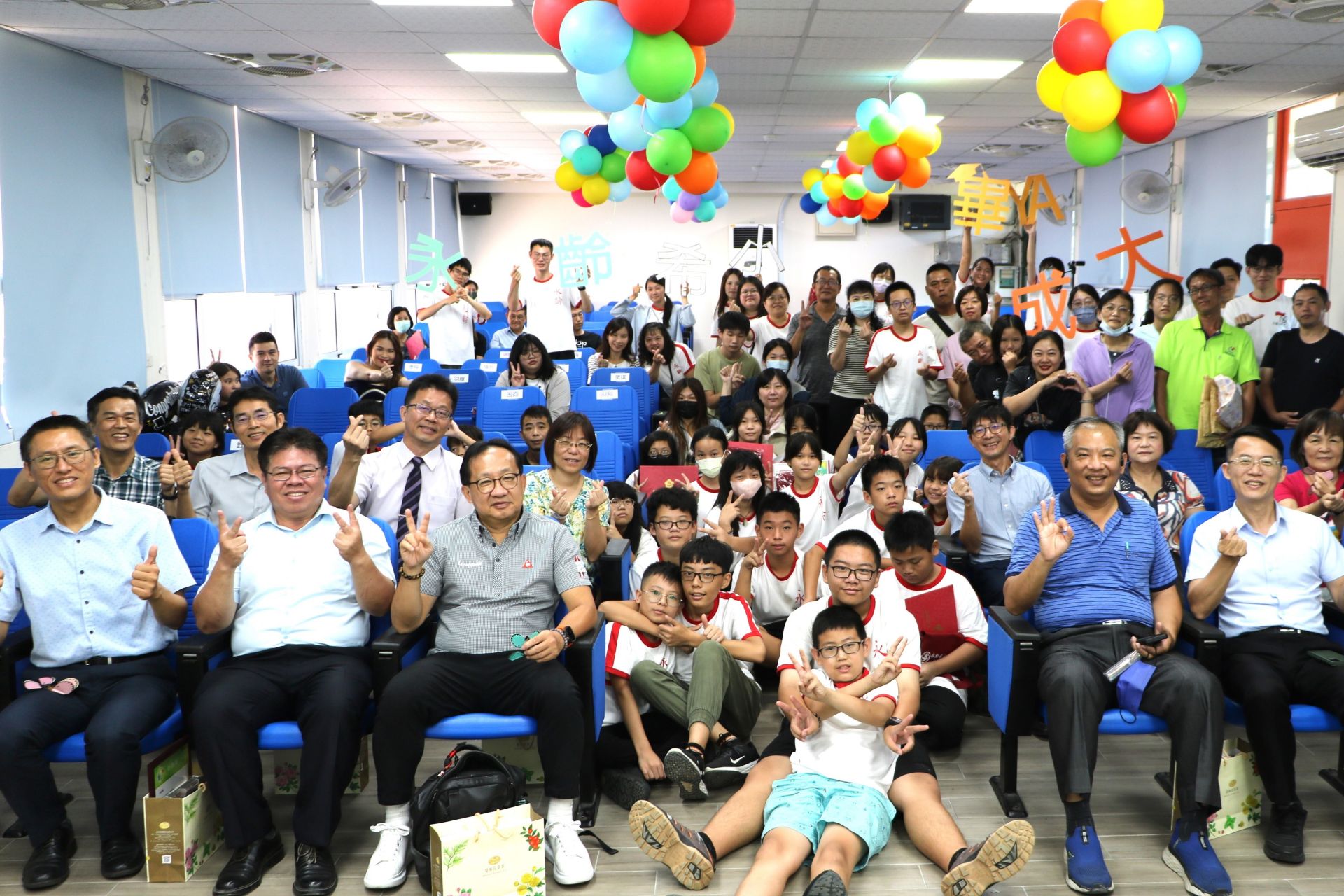NCKU "Role and Application of Artificial Intelligence on Higher Education Forum" Forum Concludes with Enthusiastic Participation
In his opening remarks, NCKU President Shen Meng-Ru stated that the impact and challenges of artificial intelligence on higher education are increasing daily. Since last year (2023), NCKU has conducted assessments and adjustments every semester, and this year the university once again convened experts from various fields to hold a two-day forum. During the first session of the forum on September 10, discussions focused on the application and development of AI on higher education worldwide, and how AI technology can be used to enhance human well-being in the context of teaching. The theme of today's session, on September 18, includes the application of AI in aesthetics, design, and performing arts, as well as an analysis of recent cases in technology law and healthcare to examine the potential inequalities caused by AI.
President Shen emphasized that the country is at a crossroads, deciding whether to become a major player or a colony in the AI revolution. From the university’s perspective, NCKU will take more proactive steps to enhance its responses. This includes implementing a digital governance checklist to review the university’s digitalization indicators starting next semester, and providing faculty, students, and staff with more diverse and convenient AI tools to comprehensively improve teaching outcomes and administrative efficiency.
In the keynote speech "The Application of Artificial Intelligence in Aesthetics and Design," Dr. Shyh-Nan Liou, Chief Research and Development Officer of the Taiwan Design Research Institute and Distinguished Professor at NCKU's Institute of Creative Industries, used print advertising as an example to illustrate the evolution of technology. He emphasized that the purpose of artistic creation is not solely to pursue realism but also to express the emotional depth of human life. Dr. Liu also shared examples of AI applications in areas such as digital democracy and precision medicine, noting that the impact of AI is comparable to that of the Second Industrial Revolution. He concluded by stating that technology is a tool for realizing the values of human civilization, and the spirit of using technology, including AI, as a tool rather than being subservient to it has become a shared issue for individuals and communities today.
In the keynote speech "The Application of Artificial Intelligence in Performing Arts Creation," Associate Professor Wei-Chien Ma from NCKU's Institute of Art shared teaching experiences from the Institute of Creative Arts and the Master's Degree Program in Drama. She presented cases where AI was used in artistic creation, covering areas such as humanities, art performcances, and interdisciplinary collaboration. Professor Ma guided students in applying AI to enhance performing arts, theatrical curation, cultural pathways, and historical humanities, while fostering creative thinking that combines humanistic cultivation with artistic creation and a sense of social responsibility.
The panel discussion was moderated by NCKU Library Director Tzu-Fun Fu, who introduced the opportunities and challenges posed by the rapid advancement of AI technology to university libraries, particularly in areas such as knowledge management, data retrieval, and academic resource provision. Through an overview of AI development and applications on higher education around the world, Director Fu shared how NCKU Library is responding to the impact of AI. She highlighted how generative AI is advancing the development of Point-of-Care Testing (POCT) and shared examples of student projects, emphasizing the theme of using technology as a tool rather than becoming subservient to it.
Associate Professor Yu-Chen Shu from the Department of Mathematics discussed how current generative AI models are essentially probability-based, and stressed that human-AI collaboration relies heavily on human discernment and critical thinking. He emphasized that the goal of education is to teach students how to critically and thoughtfully apply AI technology.
Associate Professor Chung-Ping Yang from the Department of Information Engineering shared his experience combining humanities and information technology, such as using AI to revitalize the language and culture of the Siraya people in Tainan and utilizing AI image-matching technology to help students trace the missionary journey of Dr. James Laidlaw Maxwell 150 years ago, prompting reflection on land and spirituality. Through these courses, Yang highlighted how higher education can address community needs, ensuring that even amid the unstoppable tide of technology, students can learn to coexist with AI through digital humanities courses.
Associate Professor Yu Chi-Hua from the Department of Engineering opened his discussion with the history of computing, noting that AI breakthroughs have relied heavily on advancements in computational fields. He shared his research on converting protein structures into music to train AI, emphasizing that AI outputs are guided by human instructions and that the value is ultimately human-driven. He also discussed how information models are used to identify dengue fever symptoms, improving the efficiency and reliability of frontline medical workers' judgments.
In the keynote speech "Fairness in Large Language Models (LLM)," Assistant Professor Shao-Man Li from the Miin Wu School of Computing mentioned that current artificial intelligence often reflects Western cultural and aesthetic biases. When conducting the same experiments in different linguistic or cultural contexts, LLMs tend to exhibit different tendencies. For example, when the background is set in East Asian countries, LLMs often favor male and elder perspectives. These outcomes reflect long-standing political, economic, and cultural inequalities brought about by cultural hegemony, leading to certain groups being excluded when LLMs are used to represent perspectives. This could result in society evolving in a singular direction, hindering the interaction and mutual understanding of diverse viewpoints.
Professor Li further suggested that international human rights regulations should incorporate Cultural Impact Assessments (CIAs) to ensure that artificial intelligence can be inclusive of and respectful towards the cultures of various global ethnic groups.
The afternoon panel discussion was introduced by Director Jon-Fan Hu from the Department of Psychology, who began by addressing recent events, noting that artificial intelligence (AI) is rooted in human nature. While people enjoy the benefits of AI, they should also reflect on everything that technology brings. Hu emphasized that the rise and fall of AI reflect human needs, rather than being solely dependent on the quality of the AI itself. He encouraged the audience to consider the differences between AI and humans, sharing psychology experiments related to AI's creativity and false memory. Hu argued that AI must learn to consider human welfare to prevent it from harming human communities.
Director Chang-Ching Lin from the Department of Economics then compared gender stereotypes in reality versus those generated by AI. The results showed that large language models often replicate human gender biases rather than objective data, even amplifying stereotypes about women. Lin concluded that AI's gender biases are not just technical issues, but societal ones.
Associate Professor Wan-Ju Yeh from the Department of Law continued the discussion on AI concerns by analyzing the European Union's recent implementation of the Digital Markets Act and Digital Services Act, which aim to regulate the digital economy and govern digital platforms, ensuring user rights while maintaining an open and fair digital society. In contrast, Taiwan's legal regulations are still largely based on self-regulation.
Associate Professor Wu Yi-Rui from the Interdisciplinary Studies Department took a historical approach, tracing the evolution of human perspectives on technology since the end of World War II. He noted that it was only about a decade ago that people of color were included in medical discussions, and that those of lower socioeconomic status and those with rare diseases are often overlooked by AI, preventing them from receiving timely medical resources. Wu also mentioned the World Health Organization’s attempt to study schizophrenia in different regions and languages, which faced criticism, highlighting that biases are inevitable in the medical field. He concluded by noting that the size of big data databases is of secondary importance compared to addressing such biases.
At the conclusion of the forum, Director of International Affairs Sun-Yuan Hsieh expressed special thanks to the faculty and students for their participation, reiterating NCKU's commitment to the application of AI in teaching. He announced that the forum will continue in a different format next semester. This two-day forum in 2024 attracted over 800 participants, with 23 faculty members sharing the latest AI applications and insights. The event also utilized the interactive tool Slido, allowing the audience to ask questions and interact with speakers in real time via their phones.
Through the discussions and exchanges at this forum, NCKU aims to explore the role and application of AI on higher education in greater depth, while encouraging faculty and students to develop the knowledge and skills necessary to thrive in the AI era. The forum is part of a broader initiative, which includes a series of activities such as AI micro-courses, to integrate digital governance into campus life.

President Meng-Ru Shen stated that the impact and challenges posed by artificial intelligence on higher education are growing daily, and NCKU will take even more proactive steps to enhance various response measures.

Dr. Shyh-Nan Liou, Chief Research and Development Officer of the Taiwan Design Research Institute and Distinguished Professor at NCKU's Institute of Creative Industries, was invited to share insights on "The Application of Artificial Intelligence in Aesthetics and Design."

Associate Professor Wei-Chien Ma from NCKU's Institute of Art studies shared insights on "The Application of Artificial Intelligence in Performing Arts Creation."

The "Role and Application of Artificial Intelligence on Higher Education Forum" featured two sessions, with a cumulative attendance of over 500 enthusiastic faculty members and students.

SDG10The 15th Joint Graduation Ceremony of YongLin Hope Elementary School, NCKU Branch – A Colorful and Heartwarming Celebration
View more
SDG10NCKU Library Hosts Book Exhibition Spotlighting Human Rights Issues and Extends Invitations for Series of Events
View more



















